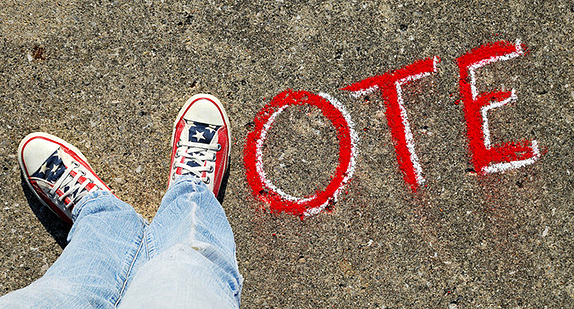
When more than 100,000 youths 16 and 17 years old cast votes Sept. 18 in the most important election in Scotland in 300 years, they also cast a ballot in the United States and dozens of other countries around the world that have been debating youth voting.
In the Scottish election, advocates of independence lost, but youths on both sides of the heated referendum won. Polling showed that the newly registered voters were as well informed as their older peers, were as serious about the issues and by and large put reasoned calculations of economic benefit ahead of emotional appeals to Scottish nationalism. There was no indication that the young were more subject to manipulation or were more naive than older voters. As a result, all of Britain is on the verge of enfranchising teenagers.
Among all voters in Scotland, independence lost by a margin of 45 percent to 55 percent. Among young voters, independence lost 49 percent to 51 percent. Thus the youth vote didn’t change the outcome but rather reinforced it.
After the election a 16-year-old English girl, Emma Jacobs, disputed the notion of emotional and easily manipulated youth in an opinion piece in The Guardian: “Actually, we’re savvy, street-wise and have unprecedented access to information. We know how to challenge authority and negotiate deals – much to our teachers’ and parents’ dismay at times. And we have a good radar for detecting hypocrisy, lies and false promises.”
She continued: “At my age I can buy a lottery ticket, have sex, drive a moped and leave school. So why am I responsible enough to have a baby or win the lottery, but not old enough to vote? The social contract that governs our society says we should have no rights without responsibilities, but we teenagers have lots of responsibilities without the precious right to vote.”
A large number of people disagree with her. Their main argument is that youths are too scatter-brained. It is said that they are immature, emotional and ignorant.
In the United States, the identical arguments were made in the late 18th century when people who didn’t own real property were first allowed to vote, in the mid-19th century when blacks were given the franchise, in the early 20th century when women won the vote, in the mid-20th century when American Indians got the vote and in 1971 when the national voting age was lowered from 21 to 18.
Every time an expansion of the franchise has been considered, those who already had the vote resisted having their influence diluted by the addition of voters they considered less qualified than themselves. (Giving citizenship and the vote to undocumented workers, of course, exposes an identical conflict of interest.)
But as Jason Brennan, an assistant professor of strategy, economics, ethics and public policy at Georgetown University, wrote on the CNN website, “The trouble is that the main reason most people cite for barring 16- and 17-year-olds from voting looks like an equally good reason to stop most American adults from voting, too.”
He continued: “Many worry that most 16-year-olds lack the wisdom or knowledge to cast smart votes, so we don't let them vote because we want to protect ourselves from their decisions. And this concern is often grounded in reality—young adults are indeed in many cases profoundly ignorant about politics. But if that is a reason for excluding them from voting, it is surely a reason to exclude almost everyone else.”
He argued that the idea of drawing a line for voting at 18 instead of 16 is baseless: “In the 1970s, psychologists discovered that the biggest increases in the capacity to reason about politics occur around age 12 when puberty hits. By 16, most people have about as stable an ideology and capacity to reason about politics as they are going to get. Any improvements after that come slowly, if at all.”
There have been a lot of efforts in American states and foreign countries to expand the franchise to those 17 or 16 years old. In the most significant success, 19 states now allow those 17 years old to vote in primaries if they will be 18 by the next general election. These states include neighboring Arizona, one of the most conservative states in the union, but not New Mexico.
Some states and municipalities are debating going further. A few years ago California rejected a state constitutional amendment that would have allowed those 16 years old to cast a 1/2 vote and those 14 years old to cast a 1/4 vote. In 2013, Tacoma Park, Md., became the first U.S. city to allow 16-year-olds to vote in local elections. The Illinois legislature has voted for a constitutional amendment that would allow 17-year-olds to vote in non-federal elections but the proposal must still be approved by the voters.
Support is growing for the youth vote in Massachusetts, where a number of statewide candidates have endorsed it, and in Maine the influential Green Party backs voting for 17-year-olds.
A number of countries, including Austria, Brazil, Cuba, Ecuador, Malta and Nicaragua have allowed youths to vote at 16, while East Timor, Indonesia, North Korea, South Sudan and Sudan put the age at 17. Iran recently allowed those 15 years old to vote, then raised the age to 18 and is now considering lowering it again.
With voting turnout among those over 18 plummeting, both major parties have been casting about for ways to increase participation (including allowing independents to vote in their primaries). It is true that those between 18 and 21 vote less than their elders. But the argument is persuasive that voting is a habit that is most successfully ingrained if begun at a young age. Thus it is said that not only do the young need the vote to have a stake in our democratic system, but the system needs the young in order to make elections a viable expression of the popular will.
Speaking form my own experience, I know lots of young people whom I would not want to see deciding who is going to govern us. By the same token I know lots of adults that I wish weren’t making those decisions. The solution is not to disenfranchise those who shouldn’t be voting but rather to educate as many people as possible—old and young— in how to fulfill their responsibilities in a democracy. New 16- and 17-year-old voters would bring new perspectives and new energy to our calcified and geriatric democracy. We need them.
(Photo by Theresa Thompson)



Responses to “Why Disenfranchise Teen Voters”